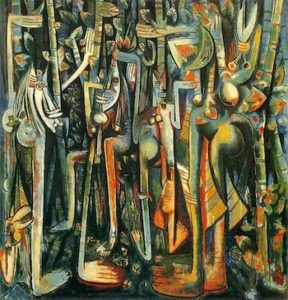
La Jungla, by Wilfredo Lam
*Afrocubanismo is affirmed on this date in 1920. This was an artistic and social movement in Black-themed Cuban culture with origins in the 1920s, as in works by the cultural anthropologist Fernando Ortiz.
The Afrocubanismo movement focused on establishing the legitimacy of Black identity in Cuban society, culture, and art. The movement developed in the interwar period when white intellectuals in Cuba openly acknowledged the significance of African culture in Cuba. Afro Cuban artistic expressions helped integrate the marginalized black community into mainstream Cuban society and art.
Since its inception, Afro Cuban Humanities has emerged as a major area of collegiate studies, and the Afrocubanismo influences can be seen in Cuban literature, painting, music, theater, and sculpture. Racial dynamics between black and white Cubans had been tense in the decades leading up to the movement's inception in the early 20th century. Before the movement that resulted in Slavery in Cuba being abolished, the Afro Cuban population struggled with fragmentation and an unbalanced social hierarchy.
The Afro Cuban population consisted of working slaves, freed slaves, and a few Black middle-class elites and intellectuals. Major artists include Fernando Ortiz: A White Cuban author and advocate of Afro Cuban studies. Nicolas Guillen, An Afro Cuban poet; Alberto Pena, Afro Cuban painter. Teodoro Ramos Blanco: Afro Cuban sculptor. Andres Alvarez Naranjo: Afro Cuban sculptor, Angel Pinto: Afro Cuban author and critic. We chose this date because, in 1866, slavery was abolished in Cuba. The disparities within the Black community were exacerbated by the systematic mistreatment and racist policies inflicted upon them by white-Cubans.
Some Afro Cuban poets and artists rejected the term “Afro Cuban” and its use as a classifying term for African-derived art. Guillen and Arredondo, two Black Afrocubanismo authors, rejected the term because it felt constructed, it separated between categories of black Cuban and white Cuban, and it made the goal of a single unified mulatto Cuban identity impossible. In this sense, themes of Afrocubanismo also include this type of anti-Afro Cuban perspectives held by some black intellectuals. Afro Cuban literature was often written to criticize the prevalent racism and gloss over social issues of racial inequality.